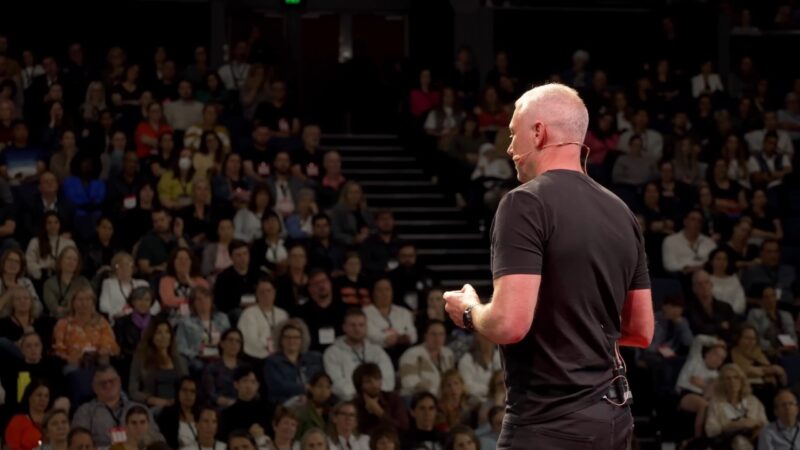Public speaking can be a daunting task, but it’s a skill that everyone can learn. One of the most important things to consider when giving a speech is the length. How long should a speech be? And how many words should it be?
The answer to these questions depends on a number of factors, including the type of speech, the audience, and the speaker’s own speaking style. However, there are some general guidelines that can help you determine the ideal length for your speech.
The Average Speaking Speed

When crafting a speech, understanding the average speaking speed is paramount. This speed typically gauged in words per minute (wpm), provides a benchmark for estimating the length of your speech in terms of word count.
On average, individuals articulate their thoughts at a pace of 125 to 150 wpm. To put this into perspective, if you’re aiming for a 5-minute address, you should be preparing a script that’s approximately 625 to 750 words in length.
However, it’s essential to note that this is a general average, and individual speaking rates can vary. There are those who naturally have a brisker pace, effortlessly delivering more words within a minute.
For such individuals, a shorter script might suffice. Conversely, those with a more measured and deliberate speaking style might find themselves needing a lengthier script to fill the same time frame.
The Type of Speech

Beyond the average speaking speed, the nature and purpose of the speech itself play a significant role in determining its ideal length. Different occasions call for different tones, content depth, and duration.
For instance, a formal address, like one you’d give at a graduation ceremony or a professional conference, typically demands more depth and detail. Such speeches are expected to be comprehensive, insightful, and often longer.
They delve into topics with thoroughness, providing listeners with a wealth of information and, as a result, necessitate a higher word count. On the other hand, casual speeches, such as toasts at weddings or remarks at informal gatherings, lean towards brevity and a conversational tone.
The emphasis here is on connecting with the audience on a personal level, often using anecdotes, humor, and shared experiences. Given their informal nature, these speeches can be concise, requiring fewer words to make an impact.
The Audience

Recognizing and understanding your audience is a fundamental aspect of speech preparation. The composition of your listeners can significantly influence both the content and duration of your address.
For instance, when addressing a cohort of experts or professionals in a specific field, you have the liberty to delve deeper into technicalities, jargon, and intricate details. Such an audience is more likely to appreciate and comprehend a lengthier, more technical discourse, as they possess the background knowledge to grasp complex concepts.
Conversely, when addressing a general audience with diverse backgrounds and varying levels of familiarity with the topic, simplicity is key. It’s crucial to present information in an accessible and relatable manner.
Lengthy technical discussions might alienate or bore listeners who aren’t well-versed in the subject. Therefore, for a broader audience, it’s often advisable to opt for a more concise, straightforward approach, ensuring that your message is both engaging and easily digestible.
The Speaker’s Own Speaking Style

Every speaker possesses a unique style, shaped by their personality, experiences, and preferences. This individual style can greatly influence the duration and flow of a speech.
Some speakers are naturally succinct, preferring to convey their message in a direct and straightforward manner. Their speeches might be shorter but packed with information, leaving little room for fluff or tangents.
In contrast, other speakers might have a more expansive style, weaving in anecdotes, elaborating on points, and taking their time to build a narrative. Such speakers might naturally gravitate towards longer speeches, using their eloquence to keep the audience engaged.
Regardless of one’s natural style, it’s essential to strike a balance. While it’s crucial to stay true to oneself, it’s equally important to cater to the audience’s needs and expectations.
One effective way to gauge the appropriateness of your speech’s length is to rehearse it aloud. This practice not only helps in timing the speech but also offers insights into areas that might need trimming or expansion.
Tips for Writing a 5-Minute Speech
Crafting a 5-minute speech might seem like a straightforward task, but ensuring it’s impactful within that short time frame requires careful planning and execution. Here are some steps and guidelines to help you create a compelling 5-minute address:
- Brainstorm Your Core Ideas: Before you start writing, take a moment to jot down the key messages you want to convey. What’s the central theme or takeaway you want your audience to remember?
- Structure is Key: Once you’ve identified your main points, arrange them in a logical sequence. This will ensure your speech flows smoothly and is easy to follow.
- Engaging Introduction: Your opening should be powerful enough to captivate your audience immediately. A thought-provoking question, a relevant quote, or a surprising fact can serve as great hooks.
- Clarity Over Complexity: While it’s tempting to showcase your vocabulary, it’s more important to be understood. Opt for clear and straightforward language that resonates with your audience.
- Steer Clear of Jargon: Unless you’re addressing a specialized audience, avoid industry-specific terms or technical jargon. It can alienate listeners and make your message less accessible.
- Narratives and Examples: Stories and real-life examples can make abstract concepts tangible and relatable. They also make your speech more memorable.
- Rehearse, Rehearse, Rehearse: Writing is just the first step. Practicing your speech out loud helps in refining your delivery, pacing, and tone. It also boosts your confidence, ensuring you come across as poised and articulate.
Bonus: How to Calculate the Ideal Length

For those who love precision and want to ensure their speech fits perfectly within a given time frame, using a speech calculator can be invaluable. One such tool is available at Debatrix.
How to Use the Debatrix Speech Calculator:
- Speaking Speed: Input your average speaking speed. If you’re unsure, the general average is between 125 to 150 words per minute.
- Main Points: Indicate the number of primary topics or sections in your speech. This helps in gauging the depth and breadth of your content.
- Sentence Length: Provide an estimate of your average sentence length. This can influence the pace and rhythm of your speech.
Once you’ve entered the necessary details, the calculator will provide an estimate of your speech’s ideal length, ensuring you strike the right balance between content and duration.
FAQ
Can I have a 5-minute speech with fewer than 625 words?
Yes, you can have a 5-minute speech with fewer than 625 words, but it is important to make sure that your speech is still comprehensive and informative. If you have less information to cover, you may need to spend more time on each point or use more complex language.
What are some common mistakes to avoid when writing a 5-minute speech?
Here are some common mistakes to avoid when writing a 5-minute speech:
- Trying to cram too much information into your speech.
- Using too much jargon or technical terms.
- Writing a speech that is too complex or difficult to follow.
- Not practicing your speech enough.
- Delivering it in a monotone voice.
Final Words
Public speaking is an art that requires meticulous preparation and understanding of various factors. The length of a speech, influenced by the average speaking speed, the nature of the speech, the audience’s composition, and the speaker’s unique style, plays a pivotal role in its effectiveness.
While the average speaking speed offers a general guideline, the type of speech, ranging from formal to casual, dictates its depth and tone. Furthermore, recognizing the audience’s expertise and background ensures the content’s relevance and accessibility.
The speaker’s personal style adds a unique flavor, making it memorable. For those aiming for precision, tools like the Debatrix Speech Calculator can be invaluable.
Ultimately, effective public speaking is a blend of content, timing, and delivery, tailored to resonate with the audience.
